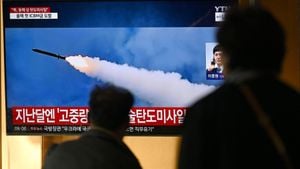The conflict between Hezbollah and Israel has intensified significantly, with both sides engaging in heavy exchanges of fire and military operations. Over recent days, the situation escalated dramatically, drawing attention and concern from the international community.
One of the latest developments involved Hezbollah launching a series of coordinated missile strikes against Israeli military targets. Reports indicate they fired around 150 rockets within just hours, targeting regions such as Haifa and northern Israel. This barrage was marked by Hezbollah’s claim of inflicting casualties among Israeli Defense Forces (IDF) personnel, with one soldier confirmed dead and several others injured, as stated by Israeli military sources.
On the Israeli side, responses have been swift and aggressive. The IDF has admitted to military casualties, acknowledging the losses which marks a significant concession for the usually reticent military branch. This admission follows reports of efficient Israeli airstrike operations aimed at Hezbollah positions, particularly those based in Beirut and southern Lebanon.
A recent night raid by Israeli air forces reportedly targeted Hezbollah’s operational base, resulting in extensive destruction of military installations and attempts to degrade Hezbollah’s operational capabilities. The IDF has stated their focus remains on neutralizing threats from Hezbollah, reiteratively supporting their strategic mission to defend Israeli territory.
Interestingly, this escalation has seen new tactics being adopted. Hezbollah has utilized not just conventional missiles but also drones, increasing the complexity of the battlefield and challenging the IDF's air defense systems. This progressive technology adoption is part of Hezbollah’s strategy to maintain tactical advantages and has proven to complicate Israel’s response mechanisms.
Adding another layer to this conflict is the backdrop of broader regional tensions. Countries such as Iran have been vocally supportive of Hezbollah, with Iranian officials indicating their readiness to bolster the group with both verbal encouragement and tangible support. Reports suggest some Iranian militia groups are active within the region, potentially lending their assistance to Hezbollah operations against Israel.
Simultaneously, there are fears of this conflict spilling over beyond the borders of Israel and Hezbollah, with several neighboring countries on high alert. Military analysts speculate about the possible reactions from countries like Syria and several Gulf nations should the battles escalate even more.
The impact of these exchanges is palpable on the ground, where civilian populations are bearing the brunt of the violence. Communities close to the border have reported increased rocket fire, leading to several injuries and psychological strain among residents. Schools have closed, and shelters have been opened as families brace for more potential attacks.
International responses have varied, with some nations calling for restraint and dialogue. Diplomatic efforts to broker peace appear futile as both factions are entrenched, each claiming the higher moral ground. The situation remains precarious as fears mount over potential war and humanitarian crises developing.
Despite the tumult, there have been some murmurs of ceasefire negotiations. Unofficial communications reportedly exist but have yet to produce any tangible results, with both Hezbollah and Israel seemingly more committed to their respective military objectives.
The geopolitical ramifications are significant as well. Many observers are watching closely to see how the United States and Western nations react to the intensifying violence, especially since Israel is historically one of their closest allies. How the international community chooses to engage or abstain could have long-standing consequences.
Looking forward, analysts predict the fighting might continue intensifying. The strategic deployment of resources, and adaptive military strategies present on both sides, suggest this conflict is far from resolution. Only time will tell how this situation evolves, but for many, the hope of peace feels like it continues to slip away.
What’s abundantly clear is the need for urgent humanitarian aid as the civilian toll rises. Aid organizations have reported growing concerns for displaced families with limited access to resources.
The world watches, anxious about what tomorrow might hold amid the echoing sirens and the bright flashes of missile fire illuminating the darkened skies of Lebanon and Israel.
This situation encapsulates the volatile nature of the Middle East, where cycles of violence seem cyclical, and peace remains ever-elusive.



